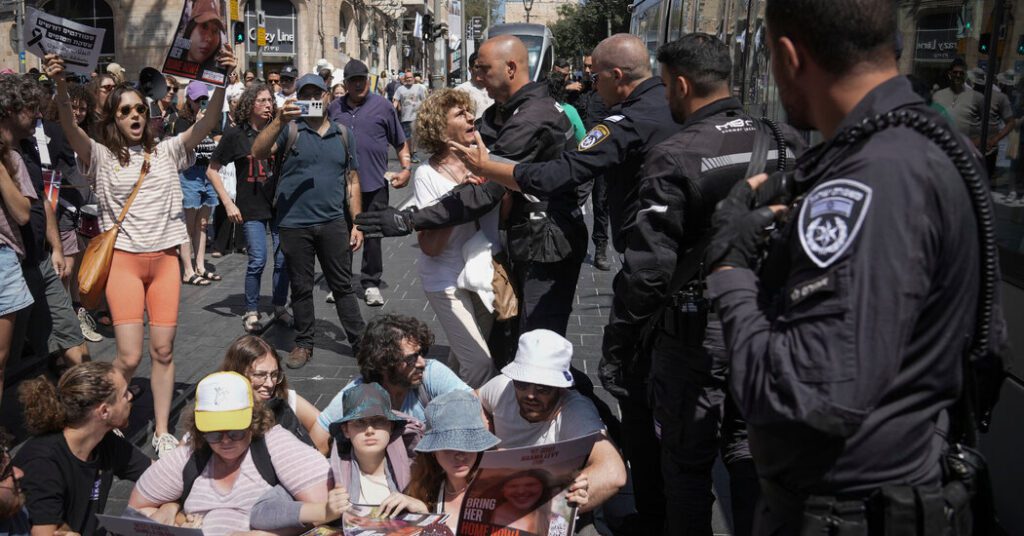Israelis on Sunday held nationwide anti-government protests to mark nine months since the devastating Hamas-led offensive on Oct. 7 and the subsequent start of the Gaza war, a day seen by many in the country as a critical milestone in the conflict.
The protesters, mainly demanding a ceasefire with Hamas, the release of hostages from hostage holdings and new elections in Israel, paralyzed morning traffic in several major intersections on highways and in cities across the country. By lunchtime, large parts of central Tel Aviv were blocked by the largest demonstrations in months.
There has been some progress in recent days towards resuming talks on an interim agreement after weeks of stalemate, while fighting continues in the Gaza Strip across Israel's northern border with Lebanon, with Israeli forces attacking the compound of a United Nations school on Saturday.
But many Israelis, including the hostages' families, fear ceasefire efforts will be thwarted not only by Hamas but also by Israeli Prime Minister Benjamin Netanyahu, who may prioritize the survival of the regime over any agreement that could topple it.
Leaders of two ultra-nationalist parties that are key members of Netanyahu's coalition government have warned they will topple the government if the prime minister agrees to a deal before Hamas is completely destroyed, a goal that many government officials and experts consider unattainable.
Protest leader Sikma Bresler said in a social media post early on Sunday that far-right parties in the ruling coalition “do not want a deal,” adding: “They need Armageddon.”
“And Bibi?” Bresler said, using a nickname for Netanyahu, adding: “We need war so that there are no elections.”
Israeli warplanes struck the compound of a United Nations school in Nuseirat, central Gaza, on Saturday. The Israeli military said Palestinian militants were operating from several buildings. The strikes killed at least 16 people and wounded dozens, according to the Gaza Health Ministry, which does not distinguish between civilians and combatants. More than 37,000 Palestinians have been killed in Gaza so far, according to local health officials.
The ministry added that the schools were serving as shelters for displaced people seeking safety. Hamas in a statement called the attack a “massacre.” The Israeli military said it had taken measures to avoid civilian casualties in the attack and accused Hamas of operating from civilian-crowded areas of Gaza.
The Israeli military said on Sunday it was continuing operations in Gaza's southernmost city of Rafah and in Shejaiya, east of the northern Gaza City. The air force also struck the city hall of Khan Yunis, a major southern city from which Israeli ground forces withdrew in April.
The military said Hamas had been using the building for military activities and that civilians had been evacuated from the area before the attack.
Israel's northern border also remained volatile on Sunday, a day after Israeli planes carried out deadly strikes on operatives of Lebanon's Hezbollah organization in the Baalbek region deep in Lebanese territory, about 40 miles northeast of Beirut.
Israel identified the target as Meisam Mustafa al-Tar and said he was a key operative in Hezbollah's air defense forces who took part in several attacks against Israel.
A barrage of about 20 rockets was fired from Lebanon into Israel on Sunday, reaching deeper than most previous salvos in months of tit-for-tat cross-border clashes, Israeli emergency services said, leaving one person seriously wounded by shrapnel.
“For the first time in months I feel hopeful” about the resumption of ceasefire talks, Einav Zangauker, whose son Matan is being held hostage in Gaza, said at the weekly Saturday night protests in Tel Aviv calling for the hostages' release.
But she added: “Mr. Netanyahu, we have seen you ruin the deal at crucial moments so many times. It has broken our hearts every time. Don't break our hearts again! It is your duty to bring back all the people you abandoned.”
Many Israelis are infuriated that Prime Minister Netanyahu has so far refused to take any personal responsibility for the failures of Israeli intelligence and policy leading up to the Oct. 7 terror attacks that Israeli officials say killed 1,200 people and took about 250 more to Gaza. Of the 120 hostages remaining in Gaza, officials say at least a third are dead.
Sunday's protests, which organizers called a nationwide “day of mayhem,” culminated with a “wake-up call” sounded outside the homes of several lawmakers and ministers, including Defense Minister Yoav Gallant, at 6:29 a.m., the time the Hamas-led attacks began on October 7.
Several tech companies said they would give their employees the day off to take part in the protests, which are expected to escalate into large rallies in Tel Aviv and Jerusalem later in the day. Sunday is a work day for most Israelis.
Indirect contacts between Israel and Hamas through US and Arab intermediaries have made recent progress, but sticking points remain and a ceasefire agreement is not thought to be imminent.
The talks are based on a three-phase framework first announced by President Biden in late May and later endorsed by the UN Security Council.
The two sides have agreed to the broad outlines of the agreement, including an initial six-week ceasefire and the release of the most vulnerable civilian hostages in exchange for Palestinian prisoners. But Hamas wants assurances that Israel will not resume the war after some of the hostages are returned. Israel says it wants the option to resume fighting and is not willing to effectively commit to a permanent ceasefire from the start.
Gaby Sobelman and Myra Novek contributed reporting.

